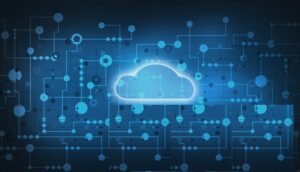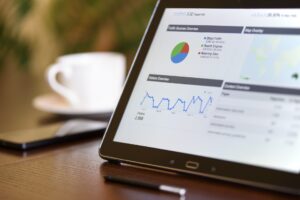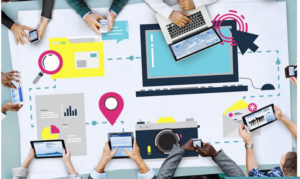Business marketers now use AI and machine learning in combination with their advertising technologies, digital assistance programs, websites, apps, etc., to better impact their marketing strategies.
“Artificial intelligence and machine learning are well on track lately and are generating about $2.6 trillion by solving the longstanding puzzles in sales and marketing.”
We may also see this going far ahead in the coming years of this decade. The organizations’ marketing teams and chief marketing officers are now focusing more on building customer trust with data-driven strategies. It is assumed that a brand that exudes empathy, which can be effectively run with data-driven strategies, can deliver better results.
The modern approach of providing a personalized approach can be elicited at scale while the CMOs and decision-makers strike the right balance between the logical and emotional parts of marketing. This makes the job of a CMO so challenging now, which can be largely helped with AI-based data strategies.
Further, we will discuss how AI and machine learning will help improve business marketing in the year 2021.
AI-driven Marketing Strategy
About 56% of modern-day businesses are either using or planning to use artificial intelligence and machine learning in their marketing strategies by next year. About 70% of the marketing teams which yield the best possible results claim that they have implemented a full-fledged AI strategy versus the others who still use the underperforming modes of marketing.
The CMOs who run high-performance teams focus on continuous learning and embrace a growth mindset. By choosing to put in the work needed for developing new machine learning and AI skills, they believe it will surely pay off with the returns through more precise market analysis and social marketing performance.
Another study suggests that about 36% of business marketers predict that artificial intelligence may have a bigger impact on marketing performance in the years to come. About 32% of the survey participants as agency professionals and marketers were already using artificial intelligence tools to create personalized ads, digital banners, as well as targeted social media posts for online marketing. As of late, customer data platforms and artificial intelligence are combined to provide better digital marketing personalization at scale.
In a nutshell, the high performing CMOs and marketing teams now lead a revolution by investing largely in artificial intelligence and machine learning to enhance their customer experience. They are focusing more on personalizing the marketing and providing individual channel experiences. This way, the high performing marketing teams are now able to increase their chances by 25% with the use of AI versus the conventional modes of marketing.
Artificial Intelligence Based Demand Sensing
Along with personalization of the marketing experience, another big thing AI does is marketing demanding sensing. With AI-based demand sensing, the marketers will be able to predict the trends and buying patterns across various geographics and demographics to plan and alleviate the scope of backorders and stockouts. By combining all available data sources and the store of historical data, marketers can effectively do the customer sentiment analysis in the context of marketing shifts through machine learning algorithms.
Machine learning algorithms can effectively correlate geo-specific sentiments to different brands and products. Having such an insight early in time will be able to save the retail industry in a big way in terms of obsolete inventory. Database administration service providers like remoteDBA can help maintain business databases in a very secure manner to be always up and made available for manipulations by AI and ML (Machine Learning) applications.
Minimizing the Inventory Risks
Another real-time use case of artificial intelligence-based business management is reducing the inventory risk by fine-tuning the forecasts in terms of product demand. We can see how effectively Disney is applying artificial intelligence modelling techniques, including ML algorithms, for fine-tuning and optimizing the media mix model. This model helps Disney aggregate the data from different sources, including the partners, and prepare the standard data model for transformation.
At the next level, various models are used to achieve the budget and optimization of the media mix. Next, by comparing the scenarios, marketers can get the most needed insights which can be presented for the buy-in of senior management.
About 40% of modern-day marketers believe that machine learning and artificial intelligence models make their greatest contributions now to accelerate revenue growth and optimize performance. Marketers can get apt and actionable insights from the available data and ensure the most personalized customer experience at scale. With these possibilities, marketers should look into machine learning and AI to automate their routine tasks to enjoy more time and energy reinvested into more campaigns.
Another real-time example can be reviewed as that of Starbucks, which set one of the most ambitious goals to be the most personalized brand across the globe by using the method of predictive analytics using machine learning. They faced many challenges starting with how challenging it is to target each individual customer to maintain their most complicated IT infrastructure to achieve this goal.
Starbucks was also highly reliant on the manual operations in thousands of their stores across the globe, which made the idea of personalization more challenging. To overcome this, Starbucks worked on a real-time personalization engine that helped integrate their customers’ account information with the customer preference mobile app through contextual data supported by a third-party service. By fine-tuning it with AI and machine learning, they are finally a 150% increase in their personalized user interaction. This further resulted in a three-fold increment in their revenues.
Wrapping things up
Considering the AI-based personalization technologies for B2C companies, the major focuses are on campaign management, building personalized mobile apps, testing and optimization of the same are the leading needs.
Still, only about 19% of the enterprises have meaningfully adopted artificial intelligence and machine learning in personalized marketing. In fact, it is a proven fact that AI-driven marketing personalization can deliver far better results beyond conventional marketing and can deliver better results enterprise-wide with better sales revenue.









